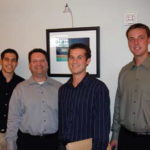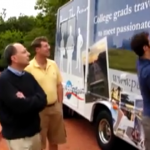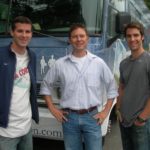Adrian’s thick British accent and his passion for entrepreneurship are the two most distinct characteristics that jumped out at us during our interview with the CEO and co-founder of Collectability. Collectability is Adrian’s fourth start-up in a ten-year period after coming to the U.S. a decade and a half ago. Adrian is from Guernsey, a part of the Channel Islands off the coast of France. Coming from the small island, he had the ambition and the intention of making a fortune in the country “where the streets are paved with gold.”
 Right now Collectability is in the “stealth” stage as Adrian described it. He said that later this year (2006) is when the website will be up and running at which point the company will reveal their plans to the world. But it will have a technical aspect that will hopefully improve communications as well as make online trading easier for collectors of assorted types of merchandise.
Right now Collectability is in the “stealth” stage as Adrian described it. He said that later this year (2006) is when the website will be up and running at which point the company will reveal their plans to the world. But it will have a technical aspect that will hopefully improve communications as well as make online trading easier for collectors of assorted types of merchandise.
Adrian started his career with a company that changed the way parental control on the web is used today. If you use MSN, Yahoo or AOL today, and there is some type of parental control, then you are probably using the technology designed by Adrian’s first company. They built the automated process of assessing these controls, replacing human browsers that once defined content as inappropriate. Now, the technology covers 10 billion web pages per month, much more efficient than any human can do. Despite the success and use of the technology, the business turned out to be a financial flop, taking $25 million of investor’s money to build the infrastructure, only to be sold to Microsoft for a lackluster $9 million. So it was a success in its mission and application, but a failure as far as capital was concerned.
There was a time in the company’s first two years of existence when it was having trouble raising money. One of the partners went to the extreme of living in the office because he could not afford an apartment. In time however, the company’s financial conditions improved and at it’s peak the company employed over 150 people.
So how does one go two years without paying yourself, risking complete financial failure and having no income? One word: resilience. After pouring the family savings into the startup of the company, Adrian and company started funding the deficit with credit cards. At this time Adrian’s wife took on the role of seeking out one promotional credit card after another, using up each card until crunch time. They even borrowed money from Adrian’s parents and from his wife’s parents as well.
It is safe to say that Adrian was an optimist, even when it seemed that there was no rational reason to keep the business afloat. But even in the face of fear and financial disaster, Adrian was determined to find success. A question was rasied: Why Adrian carry on after two years of struggling. not paying himself, borrowing money from relatives, maxing out credit cards and with bankruptcy on the verge?
“The rational part in me was asking me if I was insane, while the other side of me realized that this was so powerful. I realized that this was about pure will, and I had recognized that reserve of will, and I’m doing this because I’m doing this, and I am not going to quit. And it changed everything. I have never since been afraid of business risk. I can’t explain it to anyone or even myself.”
“Everyone I have ever talked to or came across that has been successful has had that drive to face the challenges and has had that will. A lot of people get into starting something up that don’t have that will, and those are the people that inevitably run out of steam. The people with will don’t know where to stop unless forces beyond their control pull it away from them.”
At this point, I had to ask him what in the world propels him and what would be the point that satisfaction would be reached, to which he responded:
“For me what’s so exciting about this is you start with an idea. When something does not exist and all the odds in the world are against it, and according to the book “Idea to IPO,” the quantifiable odds against an idea are a million to one. An accountant looks at that and says no way. An entrepreneur looks for ways to reduce those odds by doing this, and then doing that. You have to trust your partner or small group of people completely, and then a few years later you can sit with that same group of people and can talk about how against all the odds, it happened. The idea of having that collaborative bond is the best it can get. The potential for a gigantic return also has its attraction. My gut is that if you go in with that motivation though, it probably doesn’t help. You have to go in with something more sustaining than the elements of greed. It’s about doing good for a lot of people.”
“You have to consider yourself an entrepreneur whether you’ve recognized it or not. You better figure it out to recognize opportunities and seize them relentlessly. There are no mandatory pathways.”






